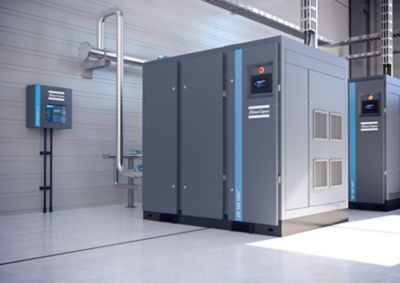July 24, 2023
Estimated reading time: 5 minutes
Industrial compressors: compressed air, it’s everywhere
Most people don't think a lot about compressed air as they go about their daily lives. However, it's used in a lot of applications all around. It is impossible to overstate the pivotal role compressed air and industrial compressors play in the global economy.
Used in almost every industry, compressed air is widely considered the fourth utility, after water, electricity, and natural gas. Today, industrial compressors are just as important as steam engines were during the industrial revolution. Without them, most manufacturing plants across the globe would stand still.
After all, about one-third of the energy a typical factory consumes is related to compressed air. But compressed air is not just needed in production facilities. It is also essential for operating ships, trains and cars. The latter use compressed air as a vital part of braking systems, suspension, and the deployment of airbags.
Compressed air is also used by a wide range of professionals – from car mechanics to dentists. Read on below to learn about how air compressors operate.
Watch this video to know more about our Industrial compressors
Energy air and active air
There are two main types of compressed air, "energy air," and "active air." As the name indicates, energy air is used for storing and transmitting energy required for mechanical work. More specifically, that means this type of compressed air is used for pneumatic tools. These range from jackhammers to dental drills.
Active air refers to compressed air that comes in contact with an end product. It is used to better preserve food and beverages. Additionally, it's found in chemical, pharmaceutical, semiconductor, and electronic industries, to name a few.
With this, active air tends to have higher purity requirements. This means contaminants such as oil, water, or dust need to be filtered out. On the flip side, energy air doesn't need the same purity standards. As a comparison, the water needed for powering a turbine or flushing a toilet doesn't have to be as clean as drinking water.
Picking the right industrial air compressor
Based on the information above, it's important to select an industrial compressor that's right for the job. The first step is usually to determine whether a business needs an oil-free compressor or can use an oil-injected one. The latter is less expensive and is recommended if there's no need for oil-free compressed air. Oil-free compressors are more costly but produce high-quality clean air necessary for food production or medical applications. Using the terminology above, oil-injected compressors are better for energy air and oil-free compressors are better for active air. It's also worth mentioning that most manufacturing jobs can use an oil-injected compressor.
Different compressor technologies for different needs
The next step is to decide whether a piston or rotary screw compressor is more suitable. Piston compressors have a lower initial investment cost and are easier to maintain. They are primarily used for applications that don't require compressed air all day long. One example is DIY garage projects. This is because piston compressors usually need to cool down during intensive use.
If you work in a quiet setting like a dental office or laboratory, it's also worth pointing out that piston compressors are quite loud. The alternative is a rotary screw compressor. While they cost more to purchase, they come with many advantages. They operate at higher speeds and can run continuously for longer periods.
In addition, they are quieter, have a relatively small footprint, and are more energy efficient. Rotary screw compressors come in two versions, fixed speed, and variable speed. Fixed speed models are suitable for applications requiring a steady flow of air at the same pressure.
Variable speed compressors, like the GA VSDS from Atlas Copco, are perfect for fluctuating all-day air demand. These are the most energy-efficient models. Their relatively high initial investment cost can be recouped early in the lifespan of the machine.
Whether you choose a piston or rotary screw compressor, there are oil-free and oil-injected models for both. This range allows businesses to choose the right equipment for their applications. There are industrial compressors for all needs, from rollercoaster operations to oil tankers and small manufacturing plants.
Ask an air system professional about the best industrial compressor options for your needs.

